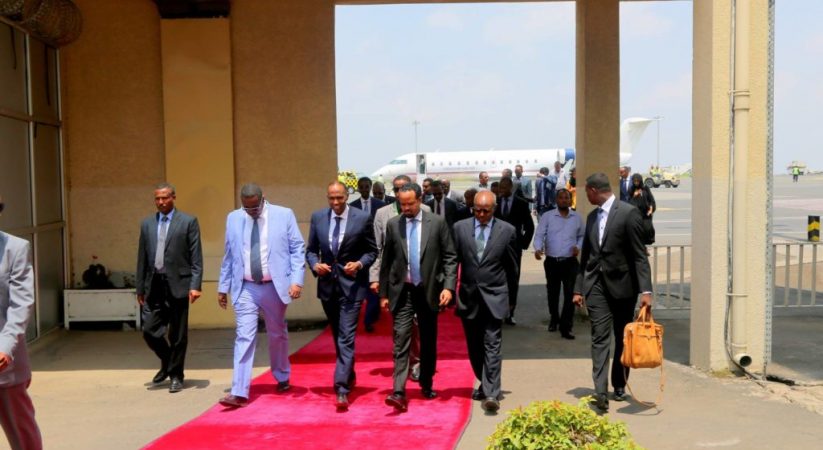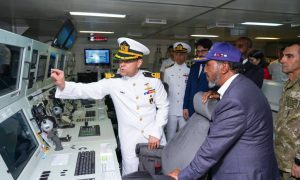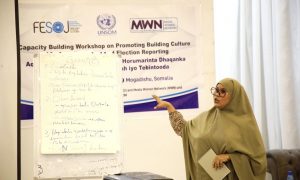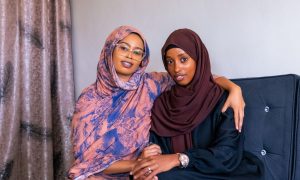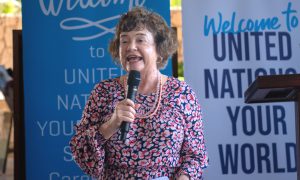
Muqdisho | QOL | June 12, 2017— At the 29th African Union (AU) Summit, African leaders will once again be confronted with the security threats in the Sahel region and the ongoing crises in the Horn of Africa. Despite some progress since the last summit, funding cuts from international partners such as the European Union (EU) and United States (US) have impacted on the AU’s operations, especially in Mali, Somalia and the fight against the Lord’s Resistance Army.
In the case of Mali, the AU had been speaking about establishing an African force to combat the terror threats in Mali and the Sahel region as a whole. But the AU’s reluctance to create the mission led the concerned G5 Sahel members (Mali, Mauritania, Burkina Faso, Chad and Niger) to establish a 5 000-strong joint force in the region in February this year. Although the AU has approved the G5 Sahel mission, the joint force requires logistical and financial support to rein in the excesses of the terror groups.
The EU, which has been funding many African peace missions, has agreed to give 50 million euros towards the payment of the G5 Sahel troops. Beside the immediate terror threats from Iraq and Syria, Europe is cognisant that the Sahel is home to many growing terror groups.
Recently, some extremist groups in the Sahel region, including Ansar Dine, Katiba Macina, al-Mourabitoun and al-Qaeda in the Islamic Maghreb, reinforced their standing by merging under a new banner – the Jamâ’ah Nusrah al-Islâm wal-Muslimîn (Group for the support of Islam and Muslims). Led by Iyad Ag Ghaly, the group has claimed various attacks since its formation and has sparked fears of an all-out onslaught in the Sahel and beyond. Mali’s neighbour Burkina Faso, for instance, has experienced over 20 terror attacks since April 2015.
Joint counter-terrorism in the Sahel and Lake Chad Basin
The emergence of terrorist groups in the Sahel and the Lake Chad Basin has been met with a strong regional response from West African countries. The G5 Sahel group was formed to take the lead on a regional approach to the extremist threat in the Sahel. The Lake Chad Basin Commission countries plus Benin have orchestrated efforts to tackle Boko Haram, forming the Multinational Joint Task Force (MNJTF) to head their military efforts.
The AU can complement these military initiatives by urging all its member states to focus on the many longer-term governance and human rights issues that drive people to join such movements. In the foreseeable future, the AU will continue to rely on regional coalitions to address terror threats in Africa while it provides legitimacy and support to the missions.
The Institute for Security Studies’ (ISS) office in Dakar, which has been working on the terrorist threats in the Sahel and the West African region, emphasised that ‘the AU should urge its member states to tackle the insecurities at various political, social and economic levels that nudge people to extremism’.
Martin Ewi, Senior Researcher at the ISS, urged the Peace and Security Council (PSC) ‘to speedily operationalise the African List of Terrorist Individuals and Organisations as provided in the 2002 Plan of Action on the Prevention and Combating of Terrorism in Africa’.
He added, ‘The list should proscribe terror groups in the region and call on every country on the continent and beyond to cooperate in denying territorial space, financial and other vital resources that sustain the terror groups.’
State building in Somalia
Somalia is another crisis area that requires the concerted efforts of the AU and its partners. Despite the security gains made against al-Shabaab and the recent electoral milestones, many state institutions in Somalia remain weak. While momentum grows to regain territory and further weaken al-Shabaab, the state still lacks the capacity to fill the governance vacuum in the recovered regions.
‘The AU should work closely with its partners to build state institutions to manage recovered areas, provide public services and win people over,’ said Meressa Kahsu, Senior Researcher and Training Coordinator at the ISS. The international community should also provide the necessary financial and logistical support to the AU Mission in Somalia (AMISOM) and the Somali Army to provide a stable security environment for the state-building initiative to succeed.
This requires world leaders to honour the pledges made at the London Conference on 11 May, including the agreements for a New Partnership for Somalia and a Security Pact for Somalia’s stabilisation. More should also be done to address the cholera epidemic and the drought, which have claimed many lives.
The AU should play a leading role in getting world leaders to support the government of President Mohamed Abdullahi Mohamed ‘Farmajo’ to make peace and development a reality for Somalis.
Peacebuilding in South Sudan
What is the fate of the August 2015 peace deal in South Sudan? And why is there an apparent international silence on the implementation of the agreement? These are some of the recurring questions in the South Sudan crisis.
The peace agreement started to unravel in July 2016 when violence erupted between forces loyal to President Salva Kiir and Vice-President Riek Machar, who are the major signatories to the deal. The renewed violence came barely three months after the formation of the transitional government of national unity in April. Machar went into exile and was replaced by Tabang Deng as the first vice president. But high levels of violence continue across the country, and South Sudan remains in the midst of an acute political, economic and humanitarian crisis.
In December 2016 Kiir announced the commencement of national dialogues in the country, but this has been criticised as an effort to deflect attention from the government’s obligation to implement the 2015 peace deal. Time is more than ripe for the establishment of a hybrid court and a truth and reconciliation commission, as stipulated by the agreement. But these have been stalled by the ongoing clashes and the uncertainties over Machar’s exile and future role in the country.
At its last summit in January 2017, the AU called for the implementation of the 2015 peace deal, but there is no momentum in getting the South Sudanese government to adhere to it. There is also still no progress on the deployment of the regional protection force, which was authorised by the United Nations (UN) last year to protect civilians amid growing fears of a looming genocide.
Amanda Lucey, Senior Researcher at the ISS, maintained that the ‘AU, IGAD [Intergovernmental Authority on Development], UN and other partners should leverage on a united front to put an end to the ongoing violence and revive discussions on securing lasting peace in the region’.
Situation in the Democratic Republic of the Congo
The political crisis in the Democratic Republic of the Congo (DRC) as a result of the delay in elections remains unresolved. The AU-mediated political agreement reached in October 2016 was not inclusive enough, with most major political parties having boycotted the process. Most political parties joined a second round of talks under the mediation of the Catholic Church, which is seen as a neutral and credible mediator.
On December 31 all parties signed an agreement that provides for the formation of a transitional government, led by a prime minister from the main opposition grouping, and for elections to be held in 2017. The accord also says that President Joseph Kabila cannot stand for an additional term.
Hailed as a sound roadmap for a transition period leading to national elections, implementation of the accord has since been undermined by drawn-out disagreements over the composition of the government and the designation of the prime minister. The Kabila government’s unilateral appointment of a prime minister from a co-opted branch of the opposition has left the agreement in tatters and the situation more polarised than ever.
The UN and numerous other countries have called upon the parties to adhere to the terms of the December 31 accord, but SADC and the ICGLR have remained silent. Stephanie Wolters, the head of the Peace and Security Research programme at the ISS, said that the AU ‘should raise its voice and call on the Kabila government to apply the December 31 accords in spirit and in letter, including by allowing the opposition to nominate the prime minister. The current government lacks the legitimacy to stabilise the volatile situation and the credibility to lead the country to elections, and the crisis will only deepen.’
At the 29th summit the AU will also be confronted with the ongoing crises in Libya, Burundi, Sudan and Guinea-Bissau.
What is key at the two-day summit is whether the AU Assembly will equip the PSC and the AU Commission with the necessary mandates to take concrete actions to mitigate these conflicts.
.
.
________________________________
_____________________________________________________________________________________
Xafiiska Wararka Qaranimo Online | Mogadishu, Somalia
_____________________________________________________________________________________Advertisement
_____________________________________________________________________________________


